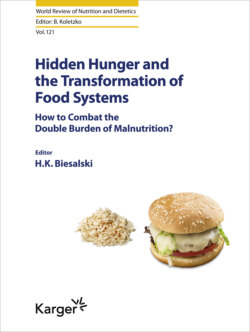Читать книгу Hidden Hunger and the Transformation of Food Systems - Группа авторов - Страница 17
На сайте Литреса книга снята с продажи.
Why the Heath Impacts Are Systematically Reproduced
ОглавлениеThe health impacts of food systems have been comprehensively researched and documented. Given the breadth and severity of the impacts described above, an urgent case for reforming food and farming systems can be made on the grounds of protecting human health. Furthermore, many of these impacts are closely linked to industrial food and farming systems, i.e., systems based on deriving productivity gains from specialization, intensification, and concentration of production and distribution. The resulting practices – chemical-intensive agriculture, intensive livestock production, the mass production and mass marketing of ultra-processed foods, and the development of long and deregulated global commodity supply chains – drive negative health impacts across the spectrum.
Why, then, has concrete action not been systematically pursued to address the root causes of unhealthy food systems? Firstly, while the evidence is clear and compelling, food systems remain complex. For example, chronic exposure to EDCs is particularly hard to trace to specific sources or even to specific chemicals, while zoonotic pathogens and antimicrobial resistance can spread through multiple pathways within and around food systems. Furthermore, many of the health impacts described above are compounded by factors like climate change, poverty, and unsanitary conditions, which are reinforced by industrial food and farming practices. This complexity is real and challenging, but should not be an excuse for inaction.
Secondly, the low power and visibility of those whose health is most affected by food systems leaves major blind spots in the evidence base. Precarious working conditions on farms, fishing vessels, and food production lines means that those exposed to the greatest health risks are not seen or heard. In particular, the insecure status of hired and migrant laborers undermines the reporting of abuses and injuries. Risks to farmers and farmworkers in developing countries are particularly under-documented. The biggest health risks tend to accrue to vulnerable groups, particularly hired and migrant laborers, who are less likely to report injuries and illnesses for fear of termination, or lack of knowledge of their right to medical services. In turn, employers may have a financial incentive to under-report injuries and illnesses that occur on their premises in order to lower their workers’ compensation insurance payments.
These blind spots make it less likely for problems to be prioritized politically, allowing health risks to continue to afflict marginalized populations. This is compounded by a broader disconnection of the general public from the process of food production. Reconnecting people with the realities of the food they eat – and bringing the true cost of our food systems to light – is therefore essential to unlock the food-health nexus.
Thirdly, the root causes of health impacts are obscured by the disproportionate power of dominant actors to set the terms of debate. Powerful actors – multinational agribusinesses, governments, donors – have the power to establish the narratives that frame the problems and the solutions. These “solutions,” from biofortification to climate-smart agriculture, are premised on further industrialization of food systems, and ignore the role of current systems in driving health risks (e.g., by perpetuating poverty and climate change). This means reinventing the problem as the solution. Meanwhile, those most affected by the health impacts in food systems (e.g., small-scale farmers in the Global South) become increasingly marginal in diagnosing the problems and identifying the solutions.
Power – to achieve visibility, to frame narratives, to set the terms of debate, and to exploit complexity as an excuse for inaction – is therefore at the heart of the food-health nexus. The concentration of power in the hands of a relatively small number of players is a key factor keeping industrial food systems in place, despite their spiraling impacts on human and planetary health. It combines with other “lock-ins” – path dependency, export orientation, and the use of narrow productivist narratives and measures of success – to hold back the paradigm shift that is urgently required [24].
